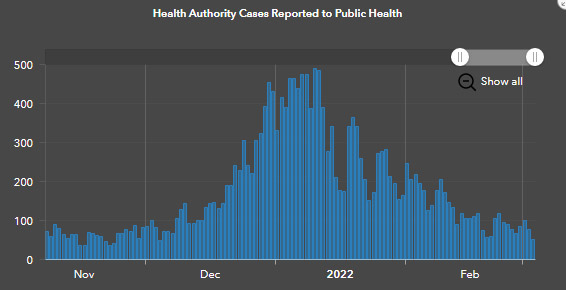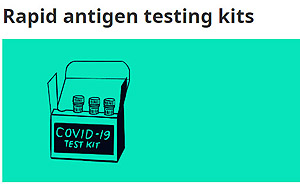Friday March 4, 2022 | VICTORIA, BC
by Mary P Brooke, B.Sc. | Island Social Trends
Starting next week, seniors age 60-plus can drop by to a local pharmacy to get free COVID rapid antigen test kits.
Each kit will contain five tests.
That can be repeated every 28 days as required, at participating pharmacies.

You’ll need to present your personal health number (PHN). Or, if you’re sending someone else to pick up the tests for you, they will need your name and personal health number, date of birth.
BC finally doing this:
For some reason, BC has been a bit behind schedule (compared to other provinces) in making at-home COVID tests available. The BC approach to the pandemic has been systematic and methodical; last month BC Health Minister Adrian Dix referred to other approaches as “chaotic”.
Highly transmissible Omicron variant:
At the start of this year (third year into the pandemic), Provincial Health Officer Dr Bonnie Henry said that if you have COVID-like symptoms that you can assume you are infected with COVID.

For that reason, Dr Henry said the total number of cases is no longer accurate. A few weeks ago there was no longer data under the categories of ‘active’ or ‘recovered’.
The Omicron variant (which started showing up in BC CDC data in December 2021) is so transmissible that now even COVID case data will be present weekly (not daily).
COVID death tallies have surged upwards this year, due in part to the sheer number of people contracting COVID, as explained by Dr Henry several times in the past few months.
Easing up on restrictions:
Despite the transmissibility of the Omicron variant, Dr Henry said in recent weeks that BC will ease up on the requirements for masks and other COVID-related public health restrictions likely mid-March, and the situation will be reviewed again mid-April.
On March 1, Dr Henry said the transition is in part to make things easier for “the health-care system, health-care workers, and grad season”.
Easing up on the indoor use of masks and requirements for physical distancing and crowd-size limits will also let-loose the pent-up frustration of society at large (communities, businesses, friends, family and neighbours) whose activities and opportunities have been in many cases significantly curtailed in the past two years of pandemic.
Vaccination levels:
In BC as of March 4, 2022, 58% of adults age 18+ have received their COVID vaccine booster dose, with 56% of age 12+ having received a booster.
The levels of second doses of COVID at March 4 are 91.2% for age 18+, 90.8% for age 12+, and 86.4% for ages 5 to 11 years.
The BC Vaccine Card is still valid with two doses. The BC Vaccine Card is still required for public indoor events (but may be eliminated soon, per Dr Henry earlier this month).
Here is the full BC Health News release, issued March 4, 2022:
Starting March 7, 2022, rapid antigen test kits will be available through community pharmacies to people aged 60 and older.
Eligible individuals can pick up one kit containing five tests every 28 days from participating pharmacies at no cost. Individuals must present their personal health number when picking up the kit or, if others are picking up kits on their behalf, in addition to the individual’s name and personal health number, date of birth must also be supplied.
Individuals should pick up a test kit when they are asymptomatic to use at a future time when they have symptoms. Guidelines for testing continue to indicate tests should be used for symptomatic individuals.
As of March 3, the Ministry of Health has shipped 3.9 million tests to pharmacy distributors. Of these, 1.8 million rapid tests have been shipped to community pharmacies throughout the province, and as many as 583,000 rapid tests have been dispensed through the more than 1,000 participating pharmacies.
B.C. is expecting to receive an additional 9 million tests from the federal government, which will support the province’s strategy to further distribute tests to members of the broader community.
Learn More:
For more information on the government’s distribution of rapid tests:
https://www2.gov.bc.ca/gov/content/covid-19/info/testing
For information on rapid antigen testing for COVID-19:
http://www.bccdc.ca/health-info/diseases-conditions/covid-19/testing/rapid-antigen-testing
For information on when to get a COVID-19 test at a collection centre:
http://www.bccdc.ca/health-info/diseases-conditions/covid-19/testing/when-to-get-a-covid-19-test
On understanding your test result:
http://www.bccdc.ca/health-info/diseases-conditions/covid-19/testing/understanding-test-results
For instructions on what to do if you test positive:
http://www.bccdc.ca/Health-Info-Site/Documents/Tested-positive-COVID19.pdf





